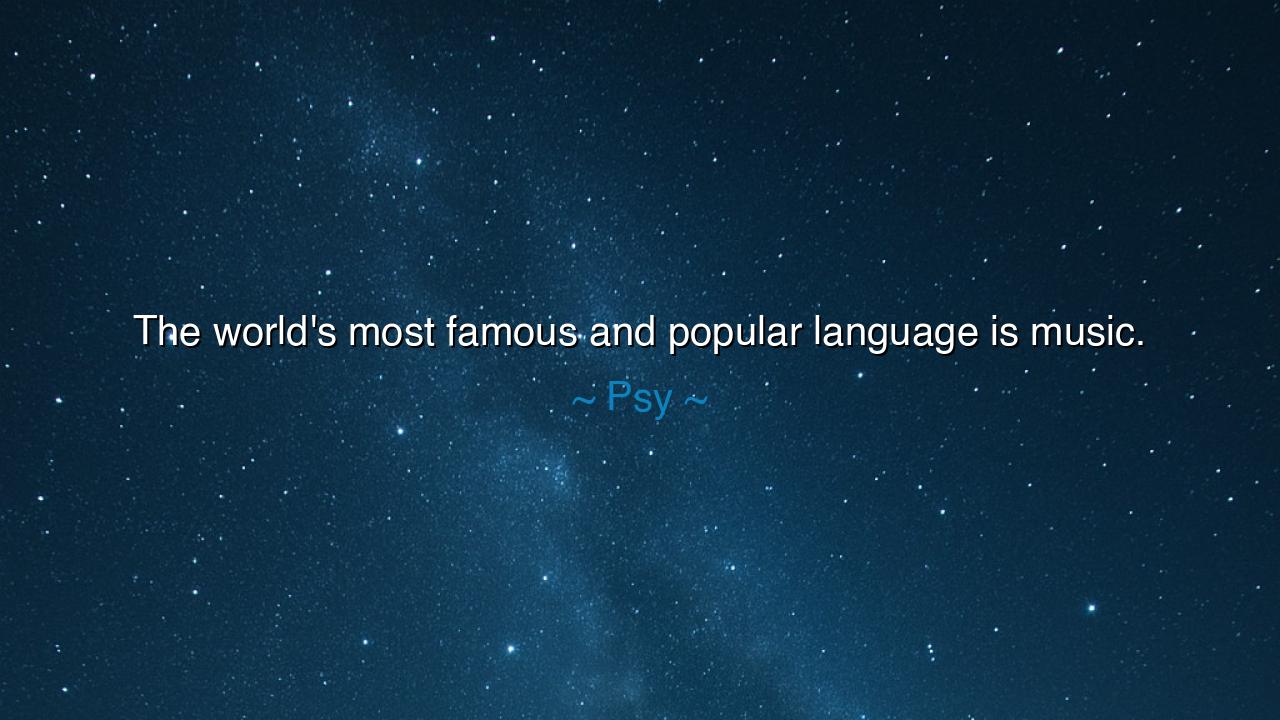
The world's most famous and popular language is music.






Opening Scene – Narrated by Host
The room was quiet, save for the gentle hum of music playing softly in the background. Jack sat by the window, watching the world outside, but his mind was focused on something that had been running through his thoughts all day—a quote that struck him deeply, not just for its simplicity, but for the truth it held.
Jeeny entered the room, a cup of tea in hand. She set it down beside Jack and sat across from him, noticing the far-off look in his eyes.
Jeeny: “You look like you’re lost in thought. What’s on your mind?”
Jack blinked, coming back to the present. He smiled at her and then spoke, his voice thoughtful.
Jack: “I was thinking about something Psy said: ‘The world's most famous and popular language is music.’ It’s so simple, but it’s true, isn’t it? Music speaks to people in a way that words alone often can’t. It crosses boundaries, connects people across cultures, and transcends language.”
Jeeny leaned forward, her eyes sparkling as she reflected on his words.
Jeeny: “That’s a beautiful thought. Music really is universal. It doesn’t matter where you’re from, what language you speak, or what culture you identify with—music can evoke emotions, bring people together, and tell stories in a way that no other form of communication can. I think that’s what makes it so powerful. It’s the one thing that speaks directly to the heart.”
Jack: “Right. And it’s not just about the lyrics, either. Even without words, a melody, a rhythm, a simple chord progression can stir something deep within us. Music has the ability to bring people together, to communicate feelings that words can’t always express. It’s a language that doesn’t need translation—it just is.”
Host: The conversation deepened, and Jack realized that Psy’s words weren’t just about music’s popularity—it was about the power of music to communicate, to connect, and to unite. It wasn’t limited by borders or language; it was a universal language that could be understood by anyone, anywhere. Music was a bridge between people, a way to express what words could not.
Jeeny: “It’s also interesting how music can evoke such different emotions depending on the person and the context. A song that makes one person feel joy might bring someone else to tears. It shows that music is more than just a shared language—it’s an individual experience, too. It’s personal, but it’s also collective.”
Jack: “Exactly. It’s this blend of the personal and the collective that makes music so powerful. A song can feel like it was made just for you, yet it can resonate with millions of others. That’s the beauty of music—it’s the most personal thing that can also be universally shared. Whether it’s a love song, a protest anthem, or a simple melody, it carries meaning that anyone can connect with, no matter where they come from.”
Jeeny: “And that’s why music has been such a tool for change throughout history. It brings people together to fight for a cause, to celebrate, to mourn, to heal. It unites people in ways that words alone can’t. It’s almost like it has the power to break down barriers, to make people feel like they’re not alone, even if they’re from different parts of the world.”
Host: Jack nodded, a sense of clarity settling in. He realized that music was more than just sound—it was a force, a language that carried meaning and connection on a deeper level. Psy’s words were a reminder that music wasn’t just a form of entertainment—it was the world’s most universal language, one that spoke to the soul and connected people across every barrier.
Jack: “So, maybe music is the key to understanding each other. It doesn’t matter what we speak, what our differences are—we can always connect through music. It’s the one language that truly brings people together.”
Jeeny: “Exactly. It’s the common thread that weaves through the human experience. In every culture, in every language, music speaks the same truth. It’s the language of the heart, of emotions, of shared humanity.”
Climax and Reconciliation
The room felt more peaceful now, as Jack and Jeeny reflected on the power of music. Outside, the world continued its rhythm, but inside, they had come to a deeper understanding: music wasn’t just about popularity or entertainment—it was a universal language that connected people in a way that words could never quite do. It was a language that transcended borders, cultures, and even time, and in that, there was a powerful force for unity and understanding.
Jack: “So, I think the lesson is that music is the bridge that unites us all. It doesn’t matter where we come from or what we believe—it speaks to the heart and connects us in a way nothing else can.”
Jeeny: “Exactly. It’s the language of humanity, of emotion, of connection. Music has the power to bring us together in ways words alone can’t.”
Host: The conversation settled into a comfortable silence. Music, in its universal form, was a reminder that no matter where we were from, we all shared the same human experience. And through music, we could speak a common language, one that transcended the boundaries of culture and language, connecting us all.






AAdministratorAdministrator
Welcome, honored guests. Please leave a comment, we will respond soon